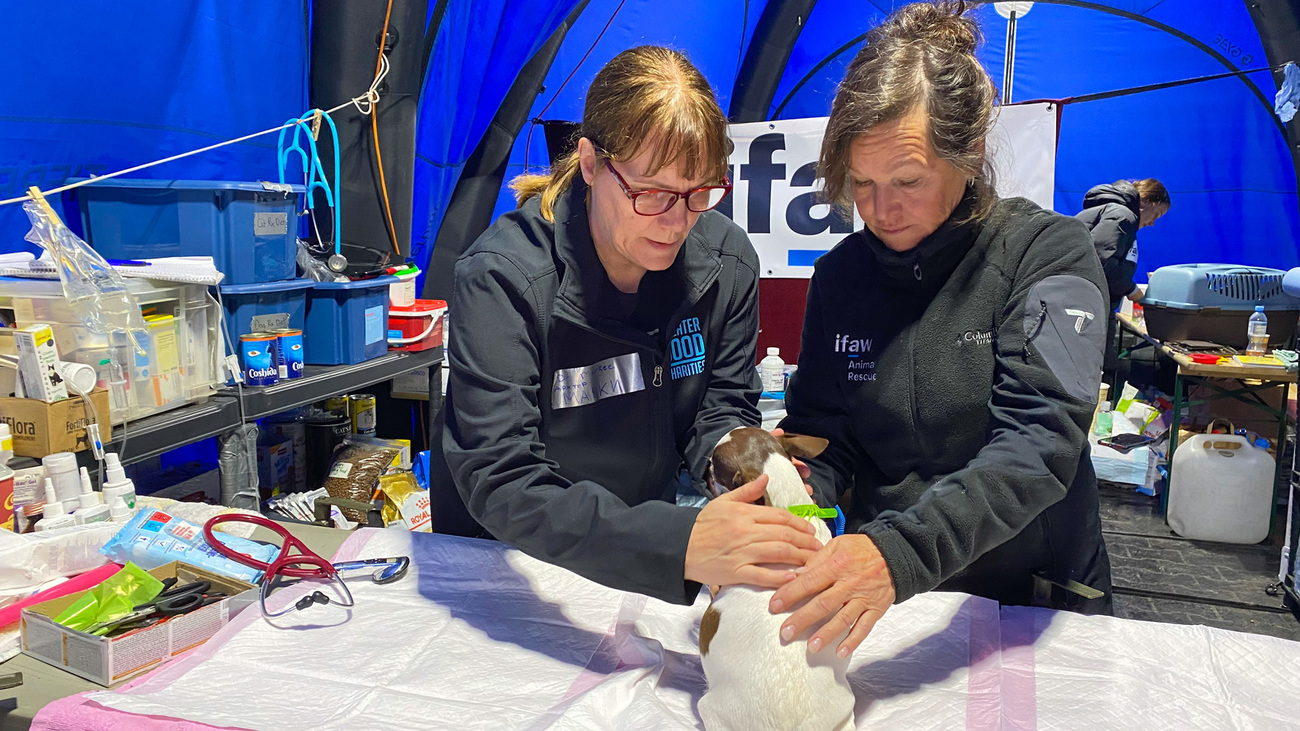Azzedine Downes
I have never been satisfied with just fighting the good fight. We need to actually make a difference.
Restoring humanity in times of crisis

Every individual animal matters. This is an integral part of IFAW’s identity—a principle that we carry with us through our work in the field and behind closed doors, from the local community all the way to the global one. We have done this through collaboration, compassion, community engagement, and—perhaps most importantly—through understanding the deep interconnectedness between humans and animals.
As the leader of an organisation recognised for its global disaster response work, I am often asked, ‘Why does IFAW devote vital resources to animals affected by conflicts when there is so much human suffering?’
My answer, although supported by rich complexities, is quite simple. While human needs must always be prioritised, the welfare of animals is intrinsically linked to the welfare of humans. When we rescue animals from disaster and protect wildlife during times of conflict, we help multiple species thrive—including our own.
Society is conditioned to accept that conflicts such as war and civil unrest will undoubtedly result in human harm. It is not, however, accustomed to thinking about the suffering that such wars and unrest cause to animals. Society often measures casualties in human lives, rarely mentioning the overwhelming effects on animals, the natural environment, and biodiversity from human-driven conflicts.
Animals and humans, as well as our fates, are deeply intertwined. Because of this deep connection, human conflict is never confined to human society alone. It spills over into all aspects of the natural environment and its inhabitants, impacting everything in its path. With no way of escaping the violence and suffering caused directly or indirectly by humans, animals are uniquely caught in the crossfire.
Whether due to wildfires in California, bushfires in Queensland, or earthquakes in Syria and Türkiye, people will always be concerned about the safety and well-being of their animals. The location changes, but the scene remains the same. Individuals tightly clutch their pets, eager for any type of assistance to help their furry, scaled, and feathered family members. Some even risk their own lives in the face of danger, refusing to evacuate until they can be reassured that their animals will also be kept safe.
The connection between people and wildlife also becomes more apparent during the chaos of conflict. Conflict leads to a breakdown in environmental protection, and as a result, we see an escalation in negative consequences, ranging from poaching to an increase in illegal wildlife trade. The single most important predictor of whether species prosper or perish is human conflict. People in war-torn regions often rely on wildlife for food or financial security. When resources are limited, tensions and conflicts inevitably rise. Increased competition over resources, food, water, and shelter creates a cycle of prolonged war and suffering—one that impacts not just humans but the natural world as well.
When we alleviate the suffering of animals—whether companion or wild—we help return a sense of normalcy to people persevering through conflict. Efforts to rescue animals affirm and amplify compassion when it is needed most.
Helping animals in distress during times of conflict also gives us hope. It reinforces what it means to be distinctly human—to extend a gentle hand of compassion, allowing us to fulfill the need to protect those who are most vulnerable.
I cannot think of a more relevant example than the current war in Ukraine. During the initial month of conflict, IFAW managed the only animal service tent at the border crossing in Medyka, Poland, welcoming thousands of refugees daily and supplying them with pet food, carriers, medicine, and emergency veterinary care. Our team met people from all walks of life who had endured the unimaginable. We met Alina, a courageous woman who escaped Mariupol with her mother and three cats. We met Viktoria and her daughter Sofia, who were travelling with three dogs, one of whom was days away from labour. We even met a family whose brave child safely transported his beloved hamster hundreds of miles in his pocket. In these moments, our work became about far more than just supporting animals. IFAW’s simple blue tent became a symbol of hope.
When we rescue one animal—a pet trapped in the path of a fire, a milking cow displaced by an earthquake, or a wild rhino stranded by floods—we are accomplishing far more than just saving the life of that single animal. We are reuniting a family. We are restoring a community’s livelihood, rebuilding balance to a human or natural construct. We are taking one more step to save a species potentially on the brink of extinction. And we are fulfilling our role as stewards of the natural world.
Time and again, research and our global experiences prove that animals are an integral part of our ability to thrive as human beings. Their importance should be highlighted rather than ignored throughout the conflicts that far too often plague the world. Humanity must make the situation right by alleviating the suffering of animals and returning a sense of normalcy to both human and animal lives that have been disrupted.
If we choose to have an impact, let it be the right form of action. An act to re-establish a sense of harmony between people and animals. Because at the end of the day, acknowledging the profound impact of conflict upon animals is a fundamental first step toward restoring our own humanity.
Azzedine Downes
I have never been satisfied with just fighting the good fight. We need to actually make a difference.
Our work can’t get done without you. Please give what you can to help animals thrive.
Unfortunately, the browser you use is outdated and does not allow you to display the site correctly. Please install any of the modern browsers, for example:
Google Chrome Firefox Safari